Unit10
人教版九年级英语全册Unit10单元教学设计

1.培养学生对健康的关注,使其认识到保持良好生活习惯的重要性。
2.增进学生对疾病患者的关爱,学会尊重、理解、帮助他们。
3.通过学习本单元,让学生认识到医学进步对人类健康的重要意义,激发他们对科学研究的兴趣。
4.引导学生树立正确的价值观,关爱生命,珍惜健康,关注社会公共卫生问题。
人教版九年级英语全册Unit10单元教学设计
一、教学目标
(一)知识与技能
1.掌握本单元的生词和短语,如:suffer, serious, disease, survive, recover, symptom, operation, cancer, AIDS等,并能正确运用到实际语境中。
2.学会使用一般现在时和现在进行时描述疾病和健康状况。
4.布置课后作业,要求学生复习本节课所学内容,为新课的学习打下基础。
五、作业布置
为了巩固本单元所学知识,确保学生对词汇、短语、语法和阅读技巧的掌握,特布置以下作业:
1.写作练习:请运用本单元所学的词汇和短语,结合一般现在时、现在进行时、一般过去时和过去完成时等时态,写一篇关于健康生活的短文,字数在100-120词左右。
3.分析课文中的祈使句、感叹句等句型,引导学生学会给出建议、表示关心和慰问。
4.通过对课文内容的分析,让学生了解疾病对人类的影响,培养他们的健康意识。
(三)学生小组讨论
1.教师将学生分成小组,针对以下问题进行讨论:
a. What are the common diseases in our daily life?
四、教学内容与过程
(一)导入新课
1.教师通过展示一组关于健康和疾病的图片,引导学生关注本单元的主题,激发他们的学习兴趣。
Unit10 知识要点解析
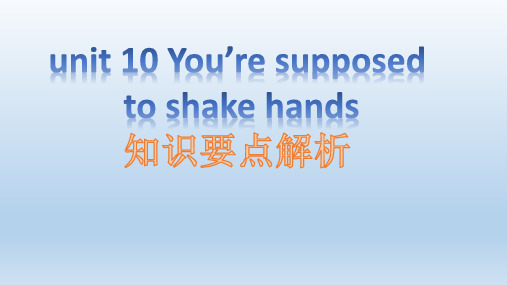
• be worth doing sth 值得做某事,句子主语一般事或物,是do的宾语 • be worth +钱 “值多少钱” • be worth +名词 “值得” • well worth ‘很值得’,不能说 very worth • 【练一练】
_________(握手)with them. • ②当第一次见朋友是,你们应该握手。 • You’re ________ to shake ______ (hand) when you meet your
friends.
3.In the United States, they’re expected to shake hands. 在美国,他们应该握手。
11.If there are people in the meeting room , you are supposed to knock before entering .
• knock v. 敲(门等), 碰撞 • knock at/on the door 敲门 knock into 与......相撞 knock down 撞倒 • 【练一练】用介词at/on,into,down填空 • 1)He knocked ______ the door , but no one answered. • 2)The car knocked ________ the tree last night and the driver hurt. • 3)The boy was knocked ________ by a running bike on the street.
tired.
人教版九年级全一册英语Unit10重点语法知识点总结
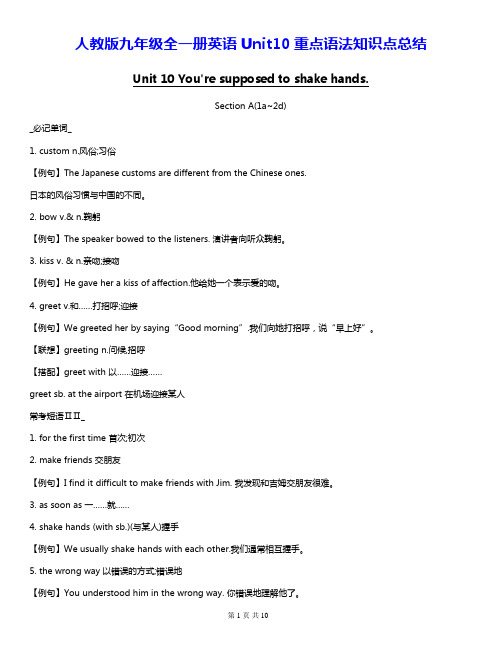
人教版九年级全一册英语Unit10重点语法知识点总结Unit 10 You're supposed to shake hands.Section A(1a~2d)_必记单词_1. custom n.风俗;习俗【例句】The Japanese customs are different from the Chinese ones.日本的风俗习惯与中国的不同。
2. bow v.& n.鞠躬【例句】The speaker bowed to the listeners. 演讲者向听众鞠躬。
3. kiss v. & n.亲吻;接吻【例句】He gave her a kiss of affection.他给她一个表示爱的吻。
4. greet v.和……打招呼;迎接【例句】We greeted her by saying“Good morning”.我们向她打招呼,说“早上好”。
【联想】greeting n.问候,招呼【搭配】greet with 以……迎接……greet sb. at the airport 在机场迎接某人常考短语ⅡⅡ_1. for the first time 首次;初次2. make friends 交朋友【例句】I find it difficult to make friends with Jim. 我发现和吉姆交朋友很难。
3. as soon as 一……就……4. shake hands (with sb.)(与某人)握手【例句】We usually shake hands with each other.我们通常相互握手。
5. the wrong way 以错误的方式;错误地【例句】You understood him in the wrong way. 你错误地理解他了。
6. hold out 伸出(手等)7. greet each other 互相问候8. to one’s surprise 令某人惊讶的是经典句型ⅢⅡ1. That's how people in Japan are expected to greet each other.那就是在日本人们互相问候的方式。
人教版九年级英语课件:Unit10(共35张PPT)
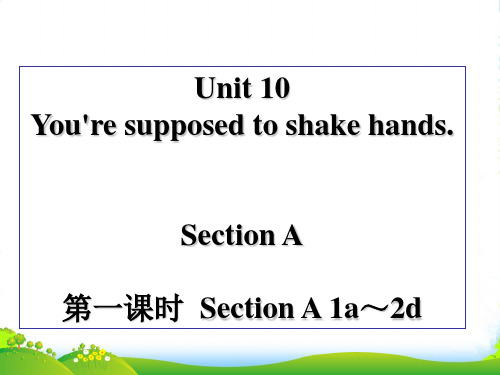
课堂同步
一、阅读课本第74页2d,回答问题。 1.What is the funny thing happened at the party? J_o_h_n_m__et__a _J_a_p_an_e_s_e__b_o_y,_a_n_d_a_s_s_o_o_n__a_s _h_e_h_e_l_d_o_u_t_ h_i_s_h_a_n_d_,t_h_e_b_o_y__b_o_w_e_d_._______________________ 2.How are Japanese people expected to greet each
A. invented B. discovered
C. found
D. found out
课堂同步
阅读课本第75页3a,判断正误。正确的写“T”,错 误的写“F”。
(T )1.It is important for people in Colombia to spend time with family and friends.
friends in our everyday lives. 我们特别珍惜平日生活中和家人、朋友在一起的时光。 spend time with sb. 与某人共度时光 如:He will not come. He spends all his free time with his
family. 他不会来。他所有的空闲时间都和他的家人在一起。
知识拓展
(1)若表示“在……上花费(时间、金钱等)”,常用句 型spend some money / some time on sth.,介词on后面 接名词或代词。 如:Kitty spends two hours on her homework every day. 凯蒂每天花两个小时做家庭作业。
九年级英语UNIT10单元短语句子
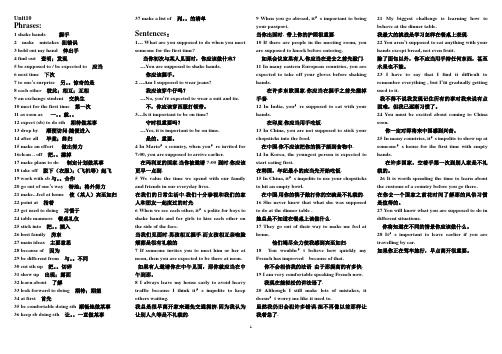
Unit10Phrases:1 shake hands 握手2 make mistakes 犯错误3 hold out my hand 伸出手4 find out 查明;发现5 be supposed to / be expected to 应当6 next time 下次7 to one’s surprise 另。
惊奇的是8 each other 彼此;相互;互相9 an exchange student 交换生10 meet for the first time 第一次11 as soon as 一。
就。
12 expect (sb) to do sth 期待做某事13 drop by 顺便访问;随便进入14 after all 毕竟;终归15 make an effort 做出努力16clean .. off 把。
擦掉17 make plans to do 制定计划做某事18 take off 脱下(衣服);(飞机等)起飞19 work with sb与。
合作20 go out of one’s way 特地;格外努力21 make...feel at home 使(某人)宾至如归22 point at 指着23 get used to doing 习惯于24 table manners 餐桌礼仪25 stick into 把。
插入26 host family 房东27 main ideas 主要意思28 because of 因为29 be different from 与。
不同30 cut sth up 把。
切碎31 show up 出现;露面32 learn about 了解33 look forward to doing 期待;期望34 at first 首先35 be comfortable doing sth 顺畅地做某事36 keep sb doing sth 让。
一直做某事37 make a list of 列。
人教版英语七年级下Unit10单词、知识梳理、词汇句式精讲

人教版英语七年级下Unit10单词、知识梳理、词汇句式精讲Unit10 单词(音标)noodle ['nuːdl] n. 面条mutton ['mʌtn] n. 羊肉beef [biːf] n. 牛肉cabbage ['kæbɪdʒ] n. 卷心菜;洋白菜potato [pə'teɪtəʊ] n.土豆;马铃薯special ['speʃəl] n.特色菜;特价品adj. 特别的;特殊的would [wʊd] modal v.(表示意愿)愿意would like愿意;喜欢yet [jet] adv. (常用于否定句和疑问句)还;仍然large [lɑː(r)dʒ] adj.大号的,大的order ['ɔː(r)də(r)] n.&v. 点菜;命令takeone’s order 点菜size [saɪz] n. 大小;尺码bowl [bəʊl] n. 碗one(large) bowl of…一(大)碗tofe [təʊfu:] n. 豆腐meat [miːt] n. (可食用的)肉dumpling ['dʌmplɪŋ] n.饺子porridge ['pɒrɪdʒ] n. 粥;面糊onion ['ʌnjən] n. 洋葱fish [fɪʃ] n. 鱼;鱼肉pancake ['pænkeɪk] 烙饼;薄饼world [wɜː(r)ld] n. 世界aroundthe world世界各地answer ['ɑːnsə] v. 回答n. 答案different ['dɪfərənt] adj.不同的cake [keɪk] n. 蛋糕candle ['kændl] n. 蜡烛age [eɪdʒ] n. 年龄makea wish许愿blow [bləʊ] v. 吹blowout吹灭if [ɪf] conj. 如果will [wɪl] v. 将要;会the UK(=theUnited Kingdom) [,ju:’keɪ]([jʊ'naɪtɪd ‘kɪŋdəm]) n.英国candy ['kændi] n. 糖果lucky ['lʌki] adj. 幸运的popular ['pɒpjʊlə] adj.受欢迎的;普遍的getpopular受欢迎;流行cutup切碎idea [aɪ'dɪə] n.想法;主意bring good luck to…给……带来好运Unit10 知识梳理【重点短语】1. would like sth. 想要某物2. would like to do sth. 想要做某事3. put on 穿上,戴上4. take one’s order 点菜5. in the beef noodles 在牛肉面里6. mapo tofu with rice麻婆豆腐外带大米7. what kind of noodles什么种类的面条8. a large bowl of noodles一大碗面条9. a medium bowl of noodles 一中碗面10. a small bowl of noodles 一小碗面条11. what size 什么尺寸12.May I take your order? 可以点餐了么?13. beef noodles with carrots带有胡萝卜的牛肉面14. green tea 绿茶15. orange juice 橙汁16. around the world 世界各地17. in different countries 在不同的国家18. birthday cakes with candles带蜡烛的生日蛋糕19. the birthday person 寿星20.make a wish 许愿21. blow out the candles 吹灭蜡烛22. in one go 一口气,一次性的23. come true 实现24. get popular 变得流行,受欢迎25. long noodles 长寿面26. cut up 切碎/断27. a symbol of long life 长寿的象征28. be different 不同的29. be the same 一样的30. bring good luck to sb. 带给某人幸运31. have different kinds of …有不同种类的......【重点句型】1. What would you like?您需要什么?2. I'm not sure yet. Are there any vegetables in the beef noodles? 我不确定,牛肉面里有蔬菜吗?3. Yes, there are some tomatoes.有,里面有西红柿。
人教九年级英语unit10单词讲解
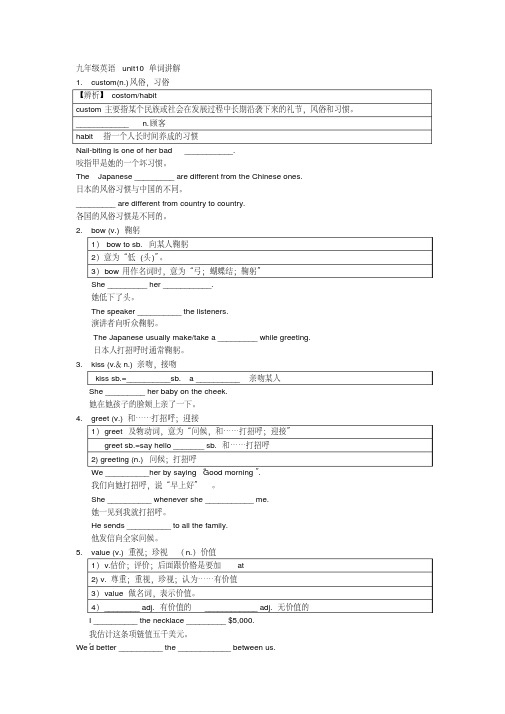
九年级英语unit10单词讲解1.custom(n.)风俗,习俗【辨析】costom/habitcustom主要指某个民族或社会在发展过程中长期沿袭下来的礼节,风俗和习惯。
____________ n.顾客habit 指一个人长时间养成的习惯Nail-biting is one of her bad ___________.咬指甲是她的一个坏习惯。
The Japanese _________ are different from the Chinese ones.日本的风俗习惯与中国的不同。
_________ are different from country to country.各国的风俗习惯是不同的。
2.bow (v.) 鞠躬1)bow to sb. 向某人鞠躬2)意为“低(头)”。
3)bow用作名词时,意为“弓;蝴蝶结;鞠躬”She _________ her ___________.她低下了头。
The speaker __________ the listeners.演讲者向听众鞠躬。
The Japanese usually make/take a _________ while greeting.日本人打招呼时通常鞠躬。
3.kiss (v.&n.) 亲吻,接吻kiss sb.=__________sb. a __________ 亲吻某人She _________ her baby on the cheek.她在她孩子的脸颊上亲了一下。
4.greet (v.) 和……打招呼;迎接1)greet 及物动词,意为“问候,和……打招呼;迎接”greet sb.=say hello _______ sb. 和……打招呼2) greeting (n.) 问候;打招呼We __________her by saying “Good morning”.我们向她打招呼,说“早上好”。
She __________ whenever she ___________ me.她一见到我就打招呼。
七年级上册英语Unit10《Canyouplaytheguitar》知识点
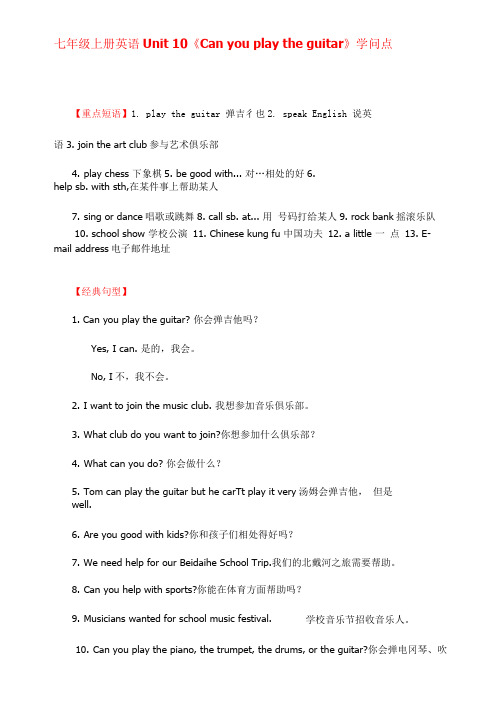
七年级上册英语Unit 10《Can you play the guitar》学问点【重点短语】1. play the guitar 弹吉彳也2. speak English 说英语3. join the art club参与艺术俱乐部4.play chess 下象棋5. be good with... 对…相处的好6.help sb. with sth,在某件事上帮助某人7.sing or dance唱歌或跳舞8. call sb. at... 用号码打给某人9. rock bank摇滚乐队10.school show 学校公演11. Chinese kung fu 中国功夫12. a little 一点13. E-mail address电子邮件地址【经典句型】1.Can you play the guitar? 你会弹吉他吗?Yes, I can. 是的,我会。
No, I不,我不会。
2.I want to join the music club. 我想参加音乐俱乐部。
3.What club do you want to join?你想参加什么俱乐部?4.What can you do? 你会做什么?5.Tom can play the guitar but he carTt play it very汤姆会弹吉他,但是well.6.Are you good with kids?你和孩子们相处得好吗?7.We need help for our Beidaihe School Trip.我们的北戴河之旅需要帮助。
8.Can you help with sports?你能在体育方面帮助吗?9.Musicians wanted for school music festival.学校音乐节招收音乐人。
10.Can you play the piano, the trumpet, the drums, or the guitar?你会弹电冈琴、吹喇叭、打鼓还是会弹吉他?11.Please call Zhang Heng at 622-6033. 请拨打622-6033 找张衡。
人教版九年级英语unit10知识总结
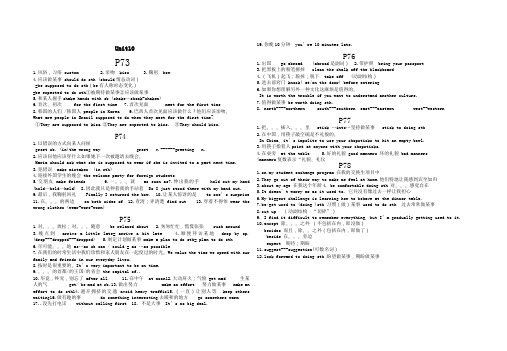
Unit10P731.风俗,习俗 custom2.亲吻 kiss3.鞠躬 bow4.应该做某事 should do sth (should 情态动词) =be supposed to do sth (be 有人称时态变化)=be expected to do sth①被期待做某事②应该做某事5.和某人握手shake hands with sb (shake —shook-shaken)6.首次、初次 for the first time7.首次见面 meet for the first time8.韩国的人们 /韩国人 people in Korea 9.巴西人首次见面应该做什么?他们应该亲吻。
What are people in Brazil supposed to do when they meet for the first time? ①They are supposed to kiss.②They are expected to kiss. ③They should kiss.P741.以错误的方式向某人问候greet sb. (in)the wrong way greet v.------greeting n. 2.应该问他应该穿什么如果她下一次被邀请去晚会。
Maria should ask what she is supposed to wear if she is invited to a part next time. 3.犯错误 make mistakes (in sth)4.迎接外国学生的晚会 the welcome party for foreign students5.交朋友 make friends6.一。
就 as soon as7.伸出我的手 hold out my hand(hold —held —held) 8.因此我只是伸着我的手站着 So I just stood there with my hand out.9.最后,我鞠躬回礼 Finally I returned the bow. 10.让某人惊讶的是 to one’s surprise11.在。
人教版英语九年级Unit10知识点

Unit10 You’re supposed to shake hands.本单元词组短语1. be supposed to do sth做⋯2. be expected to do sth./ 被希望做⋯3. shake hands (with和⋯)握(手4. bow to sb.向某人鞠躬5. for the first time首次,第一次6. people in Korea 国的人7. greet sb.( in) the wrong way 以的方式候某人8. be invited to sw. 被邀去⋯9. be invited to do sth.被邀做⋯party迎会11. as soon as 一⋯就⋯(引状从)12. as soon as sb can 尽可能快的。
out (my hands)伸出(我的手)14. on both sides of my face 在我的两个上15. be from= come from来自16. be relaxed about⋯放松/任意17. a bit/ little late晚一点18. value the time we spend with sb珍惜我与某人度的our everyday lives 在我的平常生活中20. drop by便拜,任意入21. make plans ( to do sth.)划做某事22. plan to do sth. 划做某事23. on the side of the face 在的一24. the town center在城中心25. as many as sb can = as many as possible 尽可能多的⋯26. be on time守27. the capital of clocks and watches 表之都28. after all竟,29. at noon在中午30. 15 minutes late到15分31. get / be mad (at sb)生气,气an effort (to do sth)努力做⋯ heavy traffic防备交通sb waiting 某人素来等候calling first没有早先打abroad 出国at home 在国内37. be important to⋯是重要的38. bring your passport照⋯off把⋯擦掉40 clean the chalk off the blackboard把黑板上的粉笔字擦掉northern coast of Norway挪威的北海岸42. during the winter season在冬季43. knock at/ on敲(,窗⋯)44. take off脱下,起45. be worth doing sth.得做⋯46. table manners餐桌礼47. mind your manners注意你的礼48. stick⋯into⋯ 把...插⋯an empty bowl敲空碗50. point at 指着 , point to 指向(重方向)51. at the table在餐桌旁52 at table在吃table manners基本的餐桌礼54. my biggest challenge 我最大的挑55. on my student exchange program在我的交生生is no reason to do sth. 没原因做57. go out of one’ s way (to特do地sth做.某)事⋯ ,格外努力做⋯sb feel at home使某人感觉至如59. a teenage granddaughter一个十几的(外)女60. talk to sb in French 用法和⋯交comfortable doing愉快/松做某事well/ badly/ politely止好63. behave oneself止矩64. as you can imagine 正如你想象的那65. be different from与⋯不相同/ get used to sth于某事be / get used to doing sth. 于做某事67. gradually get used to sth 逐某事68. cut it up把它切开69. eat it with a fork用叉子吃它your elbows on the table把肘部放在桌子上71. have a safe trip一路安全,旅途快乐72. show up出席,露面,到本单元知识点Section A1. In your country, what are you supposed to do when you meet someone for the first time【剖析】 be supposed to do sth被希望做某事,做 ......1)当主是人,表示告、建、任等,=should = “ tobe expected to do sth,You are supposed to___________( arrive) on time2)当主是物,表示“本;本”The train was supposed to arrive half an hour ago.【拓展】: be supposed to与should(1)be supposed 是 suppose 一的 ___________ 构。
人教版英语九年级知识点总结Unit10
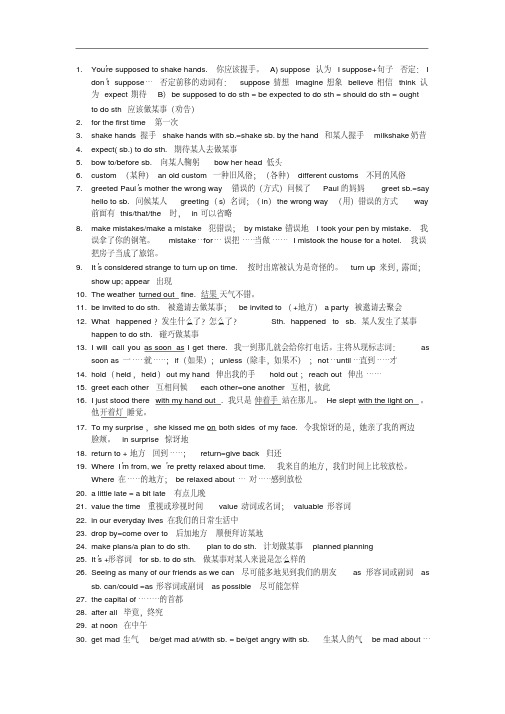
1.You’re supposed to shake hands. 你应该握手。
A) suppose 认为I suppose+句子否定:Idon’t suppose…否定前移的动词有:suppose猜想imagine想象believe相信think认为expect期待B)be supposed to do sth = be expected to do sth = should do sth = ought to do sth 应该做某事(劝告)2.for the first time 第一次3.shake hands 握手shake hands with sb.=shake sb. by the hand 和某人握手milkshake奶昔4.expect( sb.) to do sth. 期待某人去做某事5.bow to/before sb. 向某人鞠躬bow her head低头6.custom (某种)an old custom 一种旧风俗;(各种)different customs 不同的风俗7.greeted Paul’s mother the wrong way 错误的(方式)问候了Paul的妈妈greet sb.=sayhello to sb. 问候某人greeting(s)名词;(in)the wrong way (用)错误的方式way 前面有this/that/the时,in可以省略8.make mistakes/make a mistake 犯错误;by mistake错误地I took your pen by mistake. 我误拿了你的钢笔。
mistake…for…误把……当做……I mistook the house for a hotel. 我误把房子当成了旅馆。
9.It’s considered strange to turn up on time. 按时出席被认为是奇怪的。
人教版九年级英语unit10知识点

人教版九年级英语unit10知识点人教版九年级英语unit10知识1知识梳理【重点】besupposedtodosth应该做…beexpectedtodosth.应该/被期望做…shakehands(with…)(和…)握手bowtosb.向某人鞠躬forthefirsttime首次,第一次peopleinKorea韩国的人们greetsb.(in)thewrongway以错误的方式问候某人beinvitedtosw.被邀请去…...assoonas一…就…(引导时间状从)assoonassbcan尽可能快的......holdout(myhands)伸出(我的手)onbothsidesofmyface在我的两个脸颊上berelaxedabout对…放松/随意abit/littlelate晚一点valuethetimewespendwithsb珍惜我们与某人度过的时间19.inoureverydaylives在我们的日常生活中dropby顺便,随便进入makeplans(todosth.)计划做某事plantodosth.计划做某事onthesideoftheface在脸的一侧thetowncenter在城镇中心asmanyassbcan=asmanyaspossible尽可能多的…beontime守时thecapitalofclocksandwatches钟表之都afterall毕竟,终归atnoon在中午15minuteslate迟到15分钟【重点句型】Heshouldhavetoldmeaboutit.他本应该把这件事告诉我。
WhereI’mfrom,we’reprettyrelaxedabouttime.我所在的地方,对时间是相当宽松的。
Weoftenjustdropbyourfriends’homes.我们时常去朋友家拜访。
Oftenwejustwalkaroundthetowncenter,seeingasmanyofourfriendsaswecan.我们经常走遍市中心,看尽可能多的朋友。
四年级上册英语unit10单词

Unit 10 单词在四年级上册的英语学习中,Unit 10 是一个重要的单元,其中包含了许多重要的单词。
通过学习这些单词,学生们可以扩展他们的词汇量,并且能够更好地理解和运用英语。
下面是Unit 10 中的一些重要单词及其意义:1. umbrella意义:雨伞例句:I always carry an umbrella when it r本人ns.2. r本人ncoat意义:雨衣例句:She wore a r本人ncoat because it was r本人ning.3. cloudy意义:多云的例句:The sky is cloudy today.4. sunny意义:阳光明媚的例句:It's a sunny day, let's go out to play.5. windy意义:有风的例句:It's too windy to fly a kite today.6. snow意义:雪例句:We usually have snow in the winter.7. sled意义:雪橇例句:They went sledding on the hill.8. ski意义:滑雪例句:I learned how to ski last winter.9. skate意义:滑冰例句:She goes skating every winter.10. jacket意义:夹克例句:He put on a jacket because it was cold outside.11. glove意义:手套例句:She wore gloves to keep her hands warm.12. scarf意义:围巾例句:He wrapped a scarf around his neck to keep warm.通过学习这些单词,学生们可以更好地理解和运用有关天气和季节的英语词汇。
希望同学们能够通过课堂学习和词汇积累,更好地掌握英语,为将来的学习打下良好的基础。
九年级下册英语unit10笔记

九年级下册英语unit10笔记以下是九年级下册英语Unit 10的笔记,供您参考:
1. 重点单词和短语
photography(名词)摄影
camera(名词)照相机
darkroom(名词)暗室
develop(动词)冲洗
negative(名词)底片
enlargement(名词)放大
filter(名词)滤镜
brighten(动词)使变亮
shadow(名词)阴影
angle(名词)角度
pose(动词)摆姿势
equipment(名词)设备
tripod(名词)三脚架
remote(名词)遥控器
selfie(名词/动词)自拍
bright(形容词)明亮的
angle(角度)
dark(形容词)黑暗的
2. 重点句型
I like taking pictures. 我喜欢拍照。
Do you have a camera? 你有一个照相机吗?
I use a tripod to steady my camera. 我用三脚架来固定相机。
She posed for a selfie. 她摆了个自拍的姿势。
3. 语法重点
现在进行时表示将来计划要做的事情,例如:I’m coming to see you next week. 下周我要来看你。
现在完成时表示过去发生的事情对现在的影响,例如:I have already finished my homework. 我已经完成了作业。
人教版初中英语第一册Unit10教案
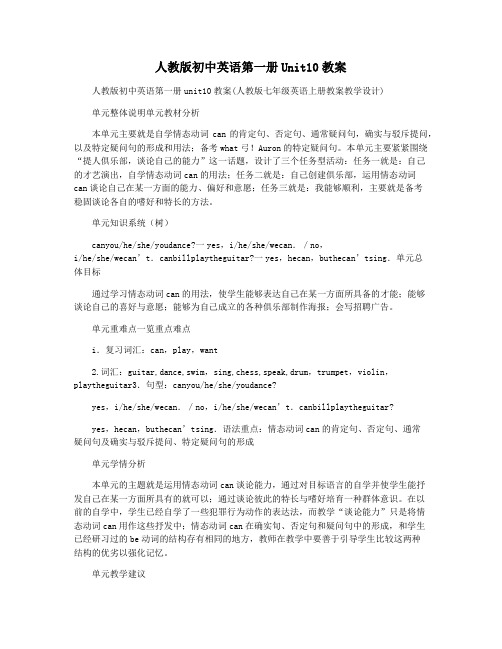
人教版初中英语第一册Unit10教案人教版初中英语第一册unit10教案(人教版七年级英语上册教案教学设计)单元整体说明单元教材分析本单元主要就是自学情态动词can的肯定句、否定句、通常疑问句,确实与驳斥提问,以及特定疑问句的形成和用法;备考what弓!Auron的特定疑问句。
本单元主要紧紧围绕“提人俱乐部,谈论自己的能力”这一话题,设计了三个任务型活动:任务一就是:自己的才艺演出,自学情态动词can的用法;任务二就是:自己创建俱乐部,运用情态动词can谈论自己在某一方面的能力、偏好和意愿;任务三就是:我能够顺利,主要就是备考稳固谈论各自的嗜好和特长的方法。
单元知识系统(树)canyou/he/she/youdance?一yes,i/he/she/wecan./no,i/he/she/wecan’t.canbillplaytheguitar?一yes,hecan,buthecan’tsing.单元总体目标通过学习情态动词can的用法,使学生能够表达自己在某一方面所具备的才能;能够谈论自己的喜好与意愿;能够为自己成立的各种俱乐部制作海报;会写招聘广告。
单元重难点一览重点难点i.复习词汇:can,play,want2.词汇:guitar,dance,swim,sing,chess,speak,drum,trumpet,violin,playtheguitar3.句型:canyou/he/she/youdance?yes,i/he/she/wecan./no,i/he/she/wecan’t.canbillplaytheguitar?yes,hecan,buthecan’tsing.语法重点:情态动词can的肯定句、否定句、通常疑问句及确实与驳斥提问、特定疑问句的形成单元学情分析本单元的主题就是运用情态动词can谈论能力,通过对目标语言的自学并使学生能抒发自己在某一方面所具有的就可以;通过谈论彼此的特长与嗜好培育一种群体意识。
九年级新目标英语unit10短语和重要句型归纳

九年级新目标英语unit10短语和重要句型归纳unit10.by the time i got outside the bus had already left.一、重点短语section a1.到…的时候_____________2.淋浴____________3.进浴室____________4.从浴室出来______________5.把…忘在家里______________6. (闹钟)闹响_____________7.迅速离开______________ 8.捎某人一程_____________9.停止运转、出故障_________________10.出席、露面____________11.愚人节________________12.激起,引起______________13.卖完,售完___________ _______________14.结婚_______________ 15.一片,一块____________ 16.到他起床的时候,他的哥哥已经进浴室了._____________________17.到他进教室的时候,老师已经开始讲课了。
______________________18.为这个故事编个结尾____________________19.和某人分享…________________20.等候某人做某事______________________ 21.出来,花开,出版______________22.准时______________23.及时____________ 24.难怪、怪不得_____________25.成功_____________26.穿好衣服____________ 27.从旁边经过、路过_____________28.让某人搭车_____________section b29.邀请某人做某事_______________30.化装舞会_____________ 31.熬夜_____________32大卫在愚人节那天发生了什么事?______________________ 33. 在第一天_____________34. 近几年中国发生了巨大的变化。
人教版英语八年级上册第十单元unit10词组
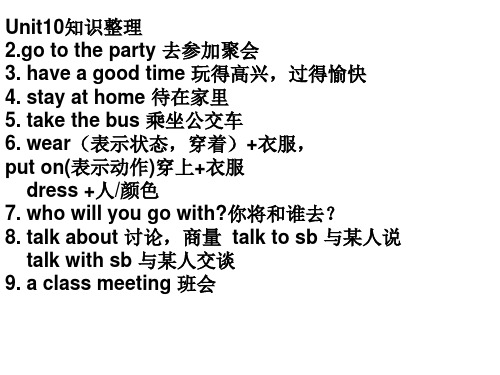
47. experience 经历,经验(不可数) 48. get into 陷入
If I am a teacher, I will be very happy. I like students and the job. In class, I’ll discuss questions with them. I’ll be glad to help them. I believe each of them will be successful. After class, we will play sports together. We’ll have a picnic on weekends. I think we’ll have a good time.
talk with sb 与某人交谈 9. a class meeting 班会
பைடு நூலகம்
10. plan to do sth 计划,打算做某事 11. half the class 班里一半的学生(是复数) 12. watch a video 看录像 13. leave for+地点 动身去某地
leave A for B 离开A去B地 14. ask sb to do sth 要求某人做某事
If I am a teacher, I won’t be angry with the students. I won’t punish(惩罚) the students in a rude(粗鲁) way. If I am a teacher, I’ll smile(微笑) at everyone.
28. go to college 去上大学 29. get an education 接受教育 30. keep….to oneself 保守秘密 31. these day 当今,如今 32. worry 名词或动词“担心” 过去式或形容词为“worried”
- 1、下载文档前请自行甄别文档内容的完整性,平台不提供额外的编辑、内容补充、找答案等附加服务。
- 2、"仅部分预览"的文档,不可在线预览部分如存在完整性等问题,可反馈申请退款(可完整预览的文档不适用该条件!)。
- 3、如文档侵犯您的权益,请联系客服反馈,我们会尽快为您处理(人工客服工作时间:9:00-18:30)。
But work is more than accomplishment and pride in being able to command the job, because except for a few craftsmen and artists most work takes place "out in the world," with an through other people.
Pride in Accomplishment
The human being longs for a sense of being accomplished, of being able to do things, with his hand, with his mind, with his will. Each of us wants to feel he or she has the ability to do something that is meaningful and that serves as a tribute to our inherent abilities.
It is easiest to see this in the craftsman who lovingly shapes some cheap material into an object that may be either useful or beautiful or both. You can see the carpenter or bricklayer stand aside and admire the product of his personal skill.
Historically, work has been associated with slavery and sin and punishment. And in our own day we are used to hearing the traditional complaints: "I can't wait for my vacation," "I wish I could stay home today," "My boss treats me poorly," "I've got too much work to do and not enough time to do it." Against this background, it may well come as a surprise to learn that not only psychologists but other behavioral scientists have come to accept the positive contribution of work to the individual's happiness and sense of personal achievement. Work is more than a necessity for most human beings; it is the focus of their lives, the source of their identity and creativity.
We're often misled by the complaints surrounding difficult work; deep down most people regard their won capacity to conquer the tough job as the mark of their own unique personality. Complaining is just part of working After all, how else do you know who you are, except as you can demonstrate the ability of your mind to control you limbs ad hands and words? You are, in significant measure, what you can do.
WHY PEOPLE WORK
Leonard R. Sayles
Jobs and work do much more than most of us realize to provide happiness sand contentment. We're all used to thinking that work provides the material things of life -- the goods and services that make possible our modern civilization. But we are much less conscious of the extent to which work provides the more intangible, but more crucial, psychological well-being that can make the difference between a full and an empty life.
Some are deceived into thinking that people like to store up energy, to rest and save themselves as much as possible. Just the opposite. It is energy expenditure that is satisfying.
And the reverse is true, too. For large numbers of people, the absence of work is harmful to their health. Retirement often brings many problems surrounding the "What do I do with myself?" question, even though there may be no financial cares. Large numbers of people regularly get headaches and other illnesses on weekends when they don't have their jobs to go to, and must fend for themselves. It has been observed that unemployment, quite aside from exerting financial pressures, brings enormous psychological troubles and that many individuals deteriorate rapidly when jobless.
Just watch an employee who must deal with countless other people because his or her job is at some central point in a communications network: a salesman at a busy counter, a stock broker on the phone, a customer representative. They will tell you how much skill and experience it takes to answer countless questions and handle various kinds of personalities every hour of the day. Not everyone can interact with such persistence and over long hours, but those who do, pride themselves on a distinctive ability that contributes mightily to the running of the organization.
Rather than a punishment or a burden, work is the opportunity to realize one's potential. Many psychiatrists heading mental health clinics have observed its healing effect. A good many patients who feel depressed in clinics gain renewed self-confidence when gainfully employed and lose some, if not all, of their most acute symptoms. Increasingly, institutions delems are establishing workshops wherein those too sick to get a job in "outside" industry can work, while every effort is exerted to arrange "real" jobs for those well enough to work outside.
